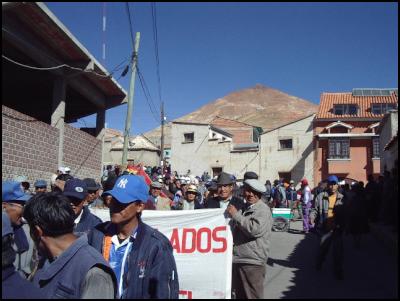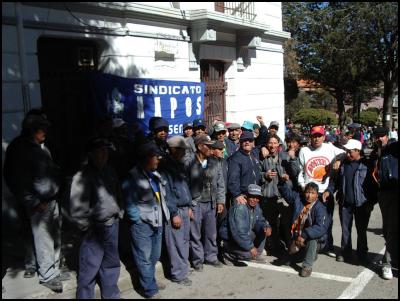New President Appointed As Workers Struggle
Bolivia Appoints New President, Workers Continue The Struggle
By Samuel Flewett and Michael Powelson

Click for big version
A crowd marching through Potosi on Tuesday, with a view of Cerro Rico, the rich mountain; the silver from which bankrolled much of early European Capitalism at the expense of Indigenous and African slaves.
Last night the Congress accepted the resignation of pro-US president Mesa, and also accepted the refusal of both the presidents of the Senate and Congress to take over as president.
The result was that the president of the Supreme Court, Rodriquez, took over as president and he has 180 days to call elections.
The strikers got some of what they wanted, but not everything. The big issue is still the nationalization of the natural gas, which won't be decided until the new government takes over.
It is not at all clear, however, that the appointment of a new president will calm the strikers, who have continued their strikes and blockades today.
In the main plaza of Potosi, union organizations were empowered by the appointment of a new president, but also swore to carry on in their struggle to nationalize the natural gas industry.
Santiago Huancya, a miner marching in the plaza, said that while Bolivia is rich, Bolivians are poor.

Click for big version
A group of miners and water workers of Potosi, with Santiago Huancya seated in the front on the right.
“How is it that Bolivia has so much mineral wealth but there is so much poverty?” he asked. “Bolivia is a rich country, but it’s people are poor.”
Huancya traveled yesterday to Sucre where the Bolivian Congress met yesterday to choose a new president. (Blockades on this road were lifted to allow 30 camiones or flatbed trucks full of protesters to pass). Huancya said he knew the miner who was killed yesterday outside of Sucre. “He was my friend,” he said. “But,” Huancya continued, “for every miner who is killed there is another one to take his place.” The situation in which the miner was killed was in a confrontation with police and army lines in which the miners were using dynamite to attack the government forces.
Bolivian miners use dynamite in their work and also use it during strikes. No one was has yet to be killed by dynamite in this struggle, and the miners use it more to shock than to injure.
When asked about the autonomous movement in Santa Cruz, Huancya was adamant. “Bolivia has nine provinces, and the people of Santa Cruz want independence. We will not allow this,” he said and he struck the palm of his hand with his fist.
“The problem here,” according to Huancya, “ is the capitalist control of the natural resources. We stand with Cuba, which has a different system, independent of the US and of the capitalists.”
A strong right-wing movement in the province of Santa Cruz and Tarija (where the natural gas is) wants more "autonomy;" in other words they don't wish to pay taxes and they want the natural gas industry kept private.
If there were elections today the likely winner would be Evo Morales, who is the leader of the coca workers union (that't right, the guys that grow the coca leaves) and also the leader of the Movimiento Al Socialismo (MAS), which is not a pro-free market, pro-US political movement. In fact, MAS identifies itself as a Marxist organization, and in its Potosi office hung pictures of Cuban president Fidel Castro and Latin American revolutionary Ernesto “Che” Guevara.
Samuel
Flewett is a New Zealander who happens to be in Bolivia at
the moment. The report above was compiled from talking to
one of the miners, with the help of an American translator,
expressing the point of view of one of the locals in the
struggle for the nationalization of the gas
here.


 Binoy Kampmark: Bratty Royal - Prince Harry And Bespoke Security Protection
Binoy Kampmark: Bratty Royal - Prince Harry And Bespoke Security Protection Keith Rankin: Make Deficits Great Again - Maintaining A Pragmatic Balance
Keith Rankin: Make Deficits Great Again - Maintaining A Pragmatic Balance Richard S. Ehrlich: China's Great Wall & Egypt's Pyramids
Richard S. Ehrlich: China's Great Wall & Egypt's Pyramids Gordon Campbell: On Surviving Trump’s Trip To La La Land
Gordon Campbell: On Surviving Trump’s Trip To La La Land Ramzy Baroud: Famine In Gaza - Will We Continue To Watch As Gaza Starves To Death?
Ramzy Baroud: Famine In Gaza - Will We Continue To Watch As Gaza Starves To Death? Peter Dunne: Dunne's Weekly - A Government Backbencher's Lot Not Always A Happy One
Peter Dunne: Dunne's Weekly - A Government Backbencher's Lot Not Always A Happy One